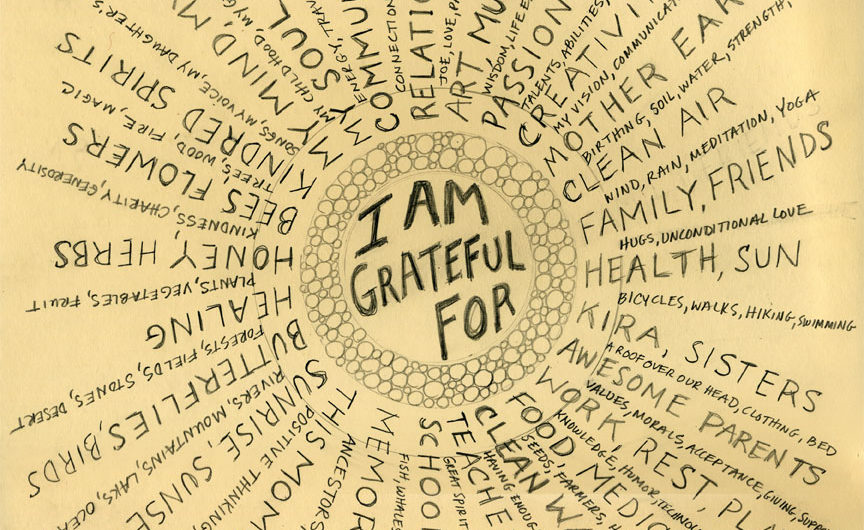All We Have Is All We Need
By Joshua Canter
I clearly remember five years ago, traveling through my home state of California and into the mountains of southern Oregon. Our core group of 12, caravaning in three cars, looked at various properties where we thought we might settle and start our community. One place after another left us uninspired and drastically surprised at the prices of properties that did not even fill a quarter of the specifics that we were looking for in a piece of land.
Did our community want to start with a 30-year mortgage? Already our projected budget for start-up had almost doubled from what we initially thought it was going to cost. Suddenly, our dream of a new, liberated, and simple life seemed more like a mirage; instead, we’d be digging ourselves into a deep, complicated hole. How were we going to do this?
A few months later, after tips from some friends, I spontaneously took a journey to Costa Rica to explore the country and to continue the search for our new home. During the two-month period, I looked at over 100 pieces of property up and down the country. Property in this country was inexpensive compared to where we were looking before, and the land was abundant in resources beyond what I could find anywhere on the west coast, with rivers, waterfalls, tropical fruit trees, rich soil, springs, wildlife, clean air…and the list went on. Costa Rica, the “Rich Coast,” was named by the Spanish after they came through and found no gold at the time. But because the land was so rich in natural beauty, they fittingly gave it its name.
On New Year’s Day, 2004, after purchasing the property, we settled on our land and True Nature began. True Nature is located in the rural farming village of La Florida. For generations the Costa Rica Natives (“Ticos”) have lived simple, sustainable, and rich lives, with almost nothing to show for it. Most of them grew up subsistence farmers, working with the land they had, using it to provide the necessities for the family. Each family in the village helped one another with growing food, caring for the children, building, and sharing resources. The families, most of them having 10 children, also grew together as they participated in celebrations, played soccer, sang traditional “rancho” songs, danced salsa, rode horses, and so on. As we arrived in the village at our new home, we soon realized we were moving into a community that had been flourishing for generations, in our eyes with almost nothing.
We showed up on our land with only the goods we could each fit into two duffel bags. Coming from the states, the four of us each had our different standards of living, but with the limited resources we had brought, we would each be leading a more materially simple existence. During the previous four years, our group had been meeting together, creating vision documents, timelines, and plans to create our community, True Nature. It was to be a flourishing education center, filled with an art studio, yoga center, community lodge, several cabins, houses for the residents, and more. I remember sitting on a stump outside the small Tico house which came with the land, looking out at the vast valley which was our property, and thinking, “How are we going to afford to do this?”
With the example that surrounded us in the Costa Rican community of La Florida, our vision began to shift drastically. We witnessed a flourishing community, as rich as we had ever seen before in many ways, living with nearly nothing. In our councils we began to ask questions like, “Why do we need a car, when we can ride a horse? Why do we need a washing machine, when we can wash by hand? Why do we need a lawnmower, when we can use a machete? Why do we need such a large vision, when we see the simplicity and harmony of a multi-generational community surrounding us?” The discussion went on for months and still goes on today.
The average wage in Costa Rica is approximately $3 an hour, and with this we understood that if we wanted to work we would either have to create our own businesses on the land, or go back to the United States to work. We also realized that because we had decided to live here, we had no mortgage; the land had been paid off completely. Many variables came forth and created lively discussions at our council meetings and around dinner time.
The cultural mentality of wealth, scarcity, and abundance became more and more clear as time went on in the village and in the creation of our own community. I watched my Costa Rican neighbors, on pieces of land on either side of me, wake up at dawn, work in the fields until sunset, come home to their families and their simple little homes, and do it again the next day. I would visit them often in the evenings and on the weekends and be amazed at how happy these people’s lives were. Children would run from house to house in the village; the men would sit on their deck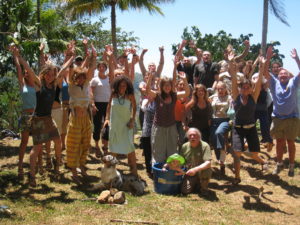 s and watch the sunset after a long day’s work; the women would visit each other often. All they had was all they needed, and they were genuinely happy. In Costa Rica, the mantra of the country is “Pura Vida” (pronounced pooda veeda), which means “pure life.” Wherever you go in the country, people say proudly, “Pura Vida.” The pure life I witnessed in the village of La Florida was a reflection that continues to guide our community today.
s and watch the sunset after a long day’s work; the women would visit each other often. All they had was all they needed, and they were genuinely happy. In Costa Rica, the mantra of the country is “Pura Vida” (pronounced pooda veeda), which means “pure life.” Wherever you go in the country, people say proudly, “Pura Vida.” The pure life I witnessed in the village of La Florida was a reflection that continues to guide our community today.
In the US, I had grown up in an upper class family in Los Angeles. Richness was not seen through natural resources and quality of life, but through the vacations we took, the cars we drove, and the clothes we wore. America today, more than ever, is looking at the question of “What is enough?”
Slowly, as time went on at True Nature, we began to want more and more. Our vision was not to live as the Ticos do, and some of us more than others were eager to move forward and begin to grow the vision that we came with originally. Struggles began to arise amongst the group as some began to propose that we begin to obtain more and more resources to help us move forward with our vision. After a year and a half, one community member purchased the first vehicle. We followed by deciding to ship an overseas crate from the United States, containing tools and materials we could not get in the country.
Around the same time that we bought our vehicle, a few other foreigners bought property in the village to start their own community projects. They came with their own mission and vision. It was to “build, and build fast.” Just as many Americans have done in the country, they came with all of their wealth from the states and created what they wanted, at the pace that many people create in the states. As this began to happen around us, it affected our community and affected the village. As the new people in La Florida brought their own form of wealth, everyone, including the Ticos and ourselves, began to watch and feel the result of this new form of abundance.
Subtly we began to desire more. We watched the new people get new cars, washing machines, chainsaws, and hot water. And naturally, we wanted these things. We watched people build structures within months, and already begin to host groups of people, a vision we had years ago; and we wanted these things. And most of all, we were struck by the effect it had on the simple native people of the “rich coast”; they wanted these things.
The next years became dynamic years of change, growth, and learning at True Nature. The key to our growth was acceptance: acceptance of all the dynamic ways and all the many forms in which life provides us gifts.
In response to the changing times, two of the founding partners of True Nature began the CREER Service Organization. The mission of the organization is to provide a bridge of education, awareness, and a global perspective from the world to the villagers of La Florida, helping to support the native culture through changing times.
We began to accept more and more the delicate balance we were finding in living in the village of La Florida and at True Nature. We understood that change was inevitable and we acknowledged also our roots, values, and each other’s diverse upbringings.
We embraced the vehicle which took us to town each week, and we also embraced the machete which cut down coconuts so efficiently. We shared gratitude for the hot water which cleaned our dirty bodies, and also marveled in the cool waters of the waterfall on our land. We used the telephone and the dial-up internet to communicate with our families and spread the word of our community and sprouting education center, and we visited our new adopted Costa Rican family nightly. We learned that truly, all we have is all we need.
Many of the experiences of the past four years have melded into who I am today, and also how I see scarcity and wealth within myself, my community, and the world. After seeing such drastic differences between the lifestyle I grew up in and the lifestyle in which I started my new life at True 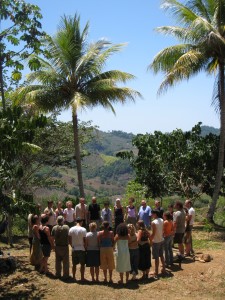 Nature, I feel that I have a broad perspective on this facet of life. Deep within myself, I have a knowing that if I need to, I can live with very little and appreciate the richness of life. If the resources of our apparent “abundant” American culture run out, I will be one of the minorities of people who will be okay, accepting “all I have is all I need.” I understand that with this, life does not come easy, and it takes hard work to live in a way that is so simple and truly rich. I also have a deep gratitude and appreciation for living with the material abundance I grew up with and that I have today in its various forms. I cherish the opportunity to have the plethora of experiences, education, and resources I have, that the Ticos in the village of La Florida may never have. Through this, I also have learned my greatest gifts: acceptance and compassion. I have an understanding that abundance, wealth, richness, means something different to everyone. I understand people have deep feelings about these topics that are sensitive and trigger some of the deepest primal parts of our selves. And I understand that throughout time, people will continue to evolve and learn more and more what the gifts of life mean to them.
Nature, I feel that I have a broad perspective on this facet of life. Deep within myself, I have a knowing that if I need to, I can live with very little and appreciate the richness of life. If the resources of our apparent “abundant” American culture run out, I will be one of the minorities of people who will be okay, accepting “all I have is all I need.” I understand that with this, life does not come easy, and it takes hard work to live in a way that is so simple and truly rich. I also have a deep gratitude and appreciation for living with the material abundance I grew up with and that I have today in its various forms. I cherish the opportunity to have the plethora of experiences, education, and resources I have, that the Ticos in the village of La Florida may never have. Through this, I also have learned my greatest gifts: acceptance and compassion. I have an understanding that abundance, wealth, richness, means something different to everyone. I understand people have deep feelings about these topics that are sensitive and trigger some of the deepest primal parts of our selves. And I understand that throughout time, people will continue to evolve and learn more and more what the gifts of life mean to them.
Just yesterday I received an article sent to me from my grandmother. The article was about a research project that studied the top four areas of the world where people live to be the oldest on the planet. To my surprise, one of the areas is just north of where True Nature is, in a village similar to La Florida. The scientist interviewed one of the oldest women of the village, who was 100 years old. He asked, “What is the secret to living such a long and healthy life here in such a simple village?” She answered, “Oyeee… I am blessed.” It is my wish that no matter what life gives us, we can realize that we are all, in our own unique ways, truly blessed.

Joshua is an educator, facilitator, and consultant, whose mission is to support people interested in exploring and learning about the many facets of living in community. He is the co-founder of the True Nature Community and Education Center (truenaturecommunity.org) in Costa Rica and The CREER Service Organization (creerbelieve.org). Through his work he hopes to help people discover how they can create ways of holistic living filled with connection, support, and interdependence. When Joshua is not living in Costa Rica he resides in Asheville, North Carolina, where he is the coleader of the Asheville Communities Network (ashevillecommunitiesnetwork.com).
For more information, contact Joshua: Joshua@truenaturecommunity.org.

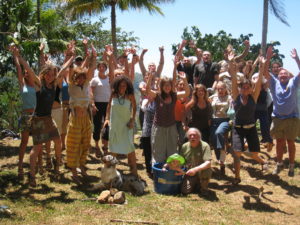
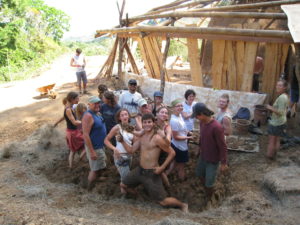
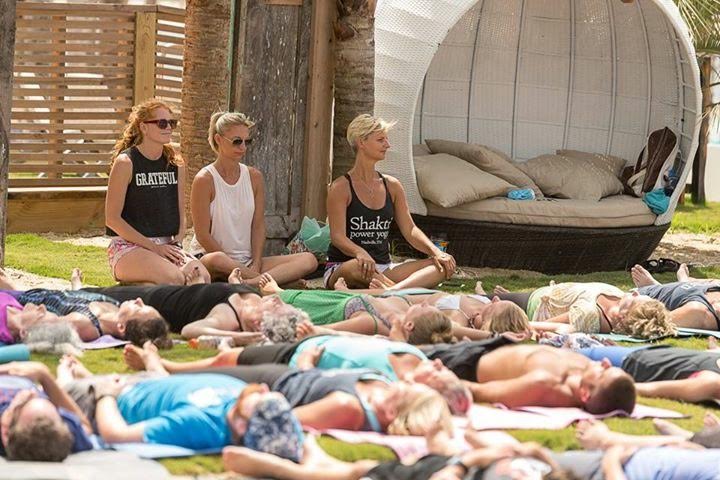

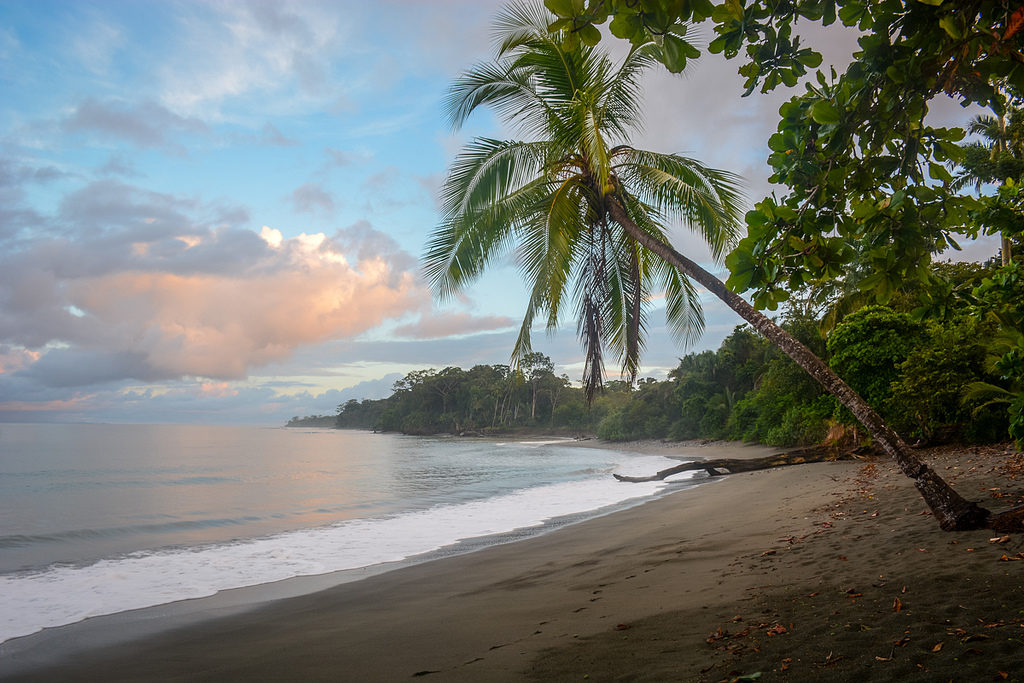
 We stay at a beautiful resort in Santa Teresa Beach. The journey from San Jose is adventurous and a special time to connect with the everyone on the bus and boat. From The moment we arrive we are greeted by the kind staff and taken to our bungalow. The smell and breeze of the ocean is present right when you arrive and you know you are only a few hundred yards from the sand being in your toes, oh bliss. The bungalows have hammocks hanging just outside, perfect place to cozy up with a book or a nice afternoon nap. There is a calm about the place and feel of home. Oh and the practice space, it overlooks the ocean and the sound of the waves remind you to breath deep and free. The warmth on your skin adds the extra heat to the practice allowing you to dive in and let the residue fade away. You are a part of nature, free to play, grow, and explore.
We stay at a beautiful resort in Santa Teresa Beach. The journey from San Jose is adventurous and a special time to connect with the everyone on the bus and boat. From The moment we arrive we are greeted by the kind staff and taken to our bungalow. The smell and breeze of the ocean is present right when you arrive and you know you are only a few hundred yards from the sand being in your toes, oh bliss. The bungalows have hammocks hanging just outside, perfect place to cozy up with a book or a nice afternoon nap. There is a calm about the place and feel of home. Oh and the practice space, it overlooks the ocean and the sound of the waves remind you to breath deep and free. The warmth on your skin adds the extra heat to the practice allowing you to dive in and let the residue fade away. You are a part of nature, free to play, grow, and explore. 
 he kids, sing, teach yoga, paint, garden, or anything we can do to be of service for the school. I know we get more out of it than the students. Our hearts are filled when we get to make a real connection with children and the feel of welcome and love from this is inspiring to see. I feel we left more connected and stronger as a group after this project, we still talk about the amazing kids and look forward to returning next year. Kelly, Jennifer, and I have a strong connection and we do a great job of going with the flow and working together. I think we all 3 could be sisters! We each have our own unique way to connect with people, how we teach, but we all three are committed to impact and build community and to live an INSPIRED life.
he kids, sing, teach yoga, paint, garden, or anything we can do to be of service for the school. I know we get more out of it than the students. Our hearts are filled when we get to make a real connection with children and the feel of welcome and love from this is inspiring to see. I feel we left more connected and stronger as a group after this project, we still talk about the amazing kids and look forward to returning next year. Kelly, Jennifer, and I have a strong connection and we do a great job of going with the flow and working together. I think we all 3 could be sisters! We each have our own unique way to connect with people, how we teach, but we all three are committed to impact and build community and to live an INSPIRED life.
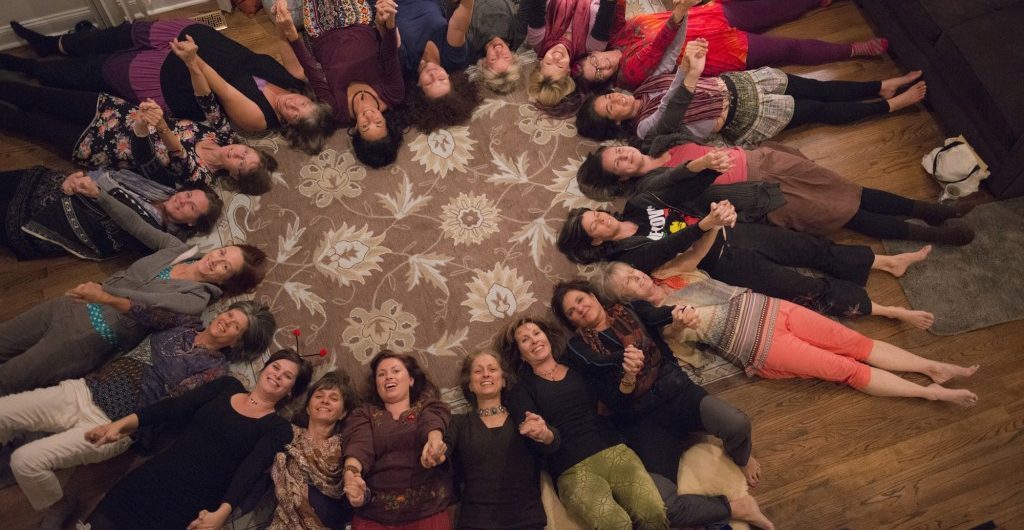
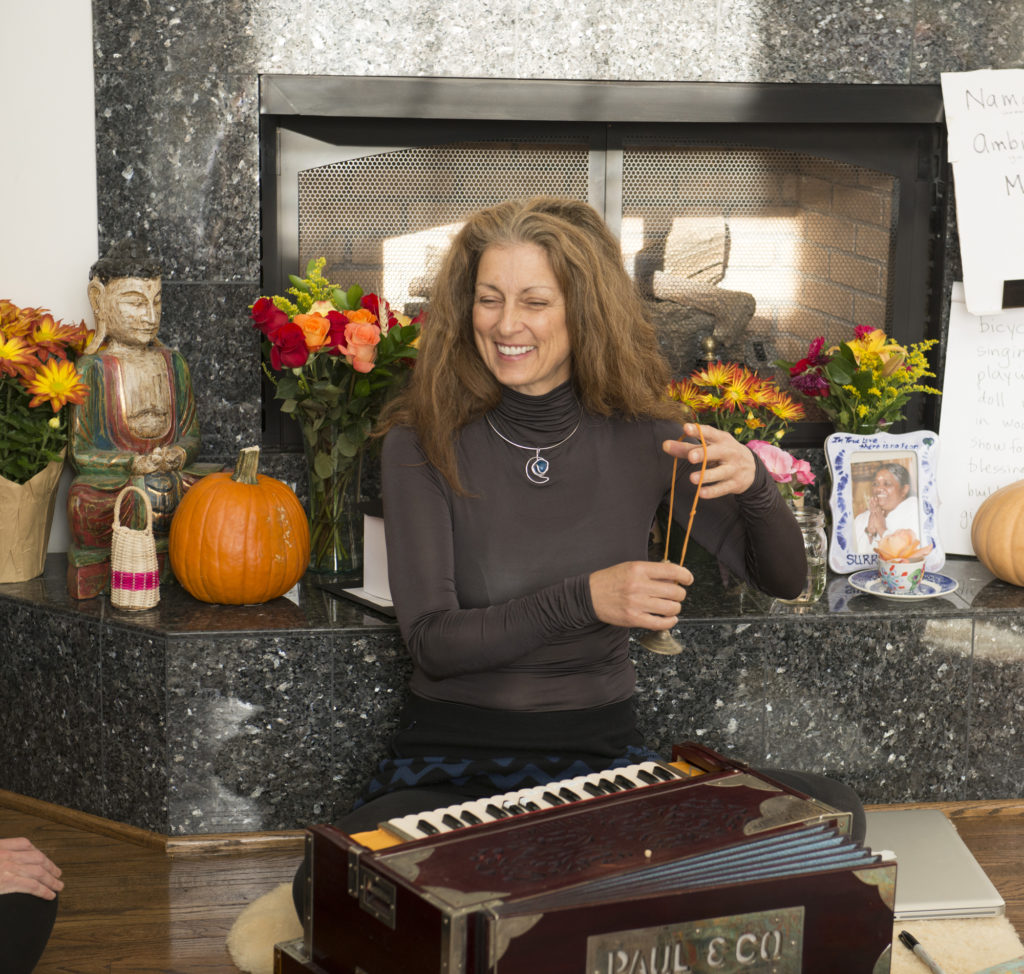
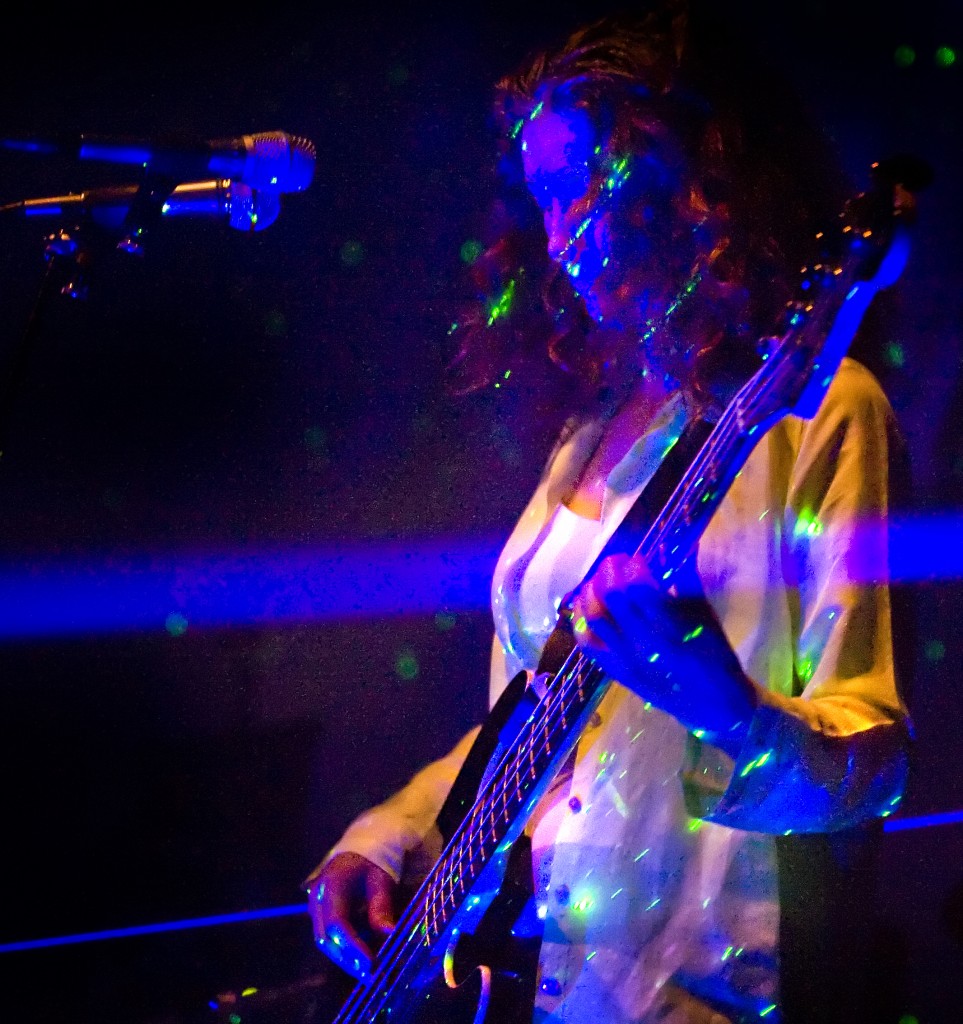 A little back story of WAH! First, the music. If you’ve been in a yoga class in the last five years, you have no doubt heard her music. The first female to bring kirtan music [call-and-response chanting performed in India’s devotional traditions] to the West in the 1990’s, Wah! has been playing bass guitar with her wildly joyful rock band at yoga festivals and centers around the U.S. since 1997. She has also consistently offered music and albums to the therapeutic market; her Savasana CDs have sold over 70,000 copies worldwide.
A little back story of WAH! First, the music. If you’ve been in a yoga class in the last five years, you have no doubt heard her music. The first female to bring kirtan music [call-and-response chanting performed in India’s devotional traditions] to the West in the 1990’s, Wah! has been playing bass guitar with her wildly joyful rock band at yoga festivals and centers around the U.S. since 1997. She has also consistently offered music and albums to the therapeutic market; her Savasana CDs have sold over 70,000 copies worldwide.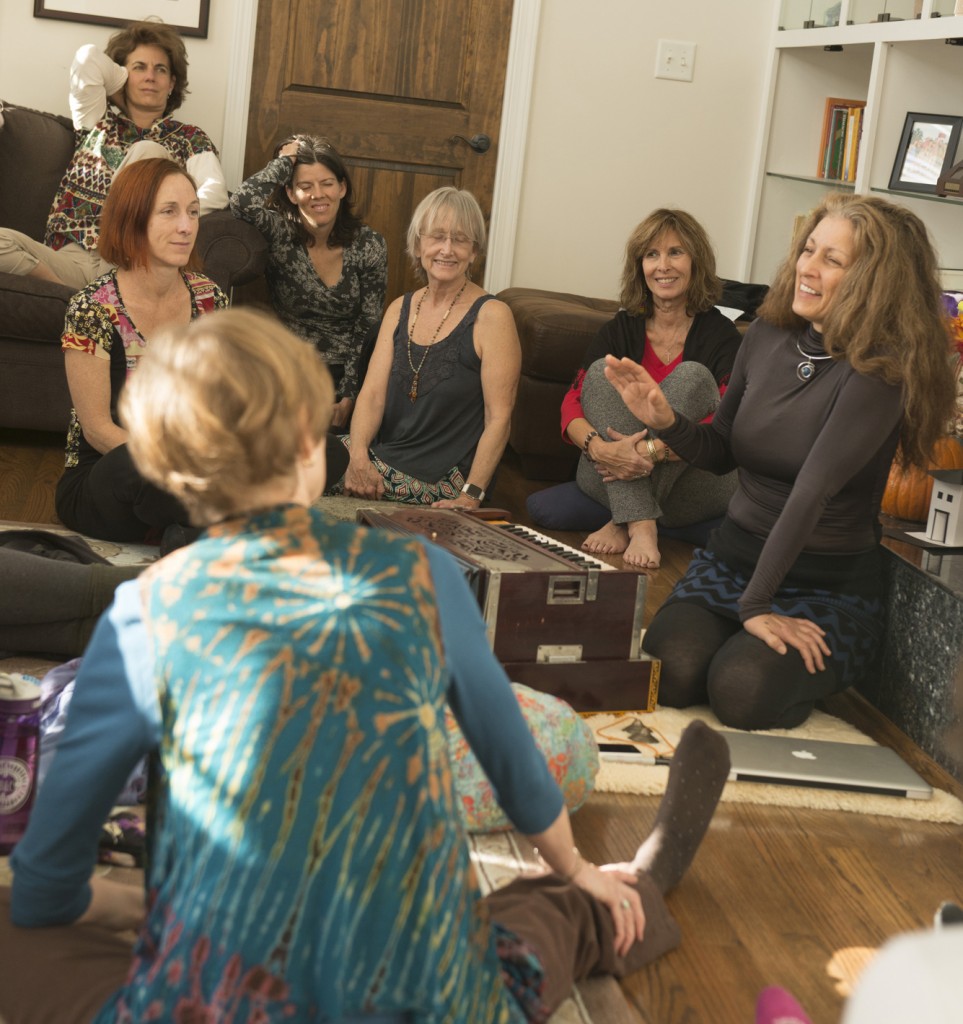
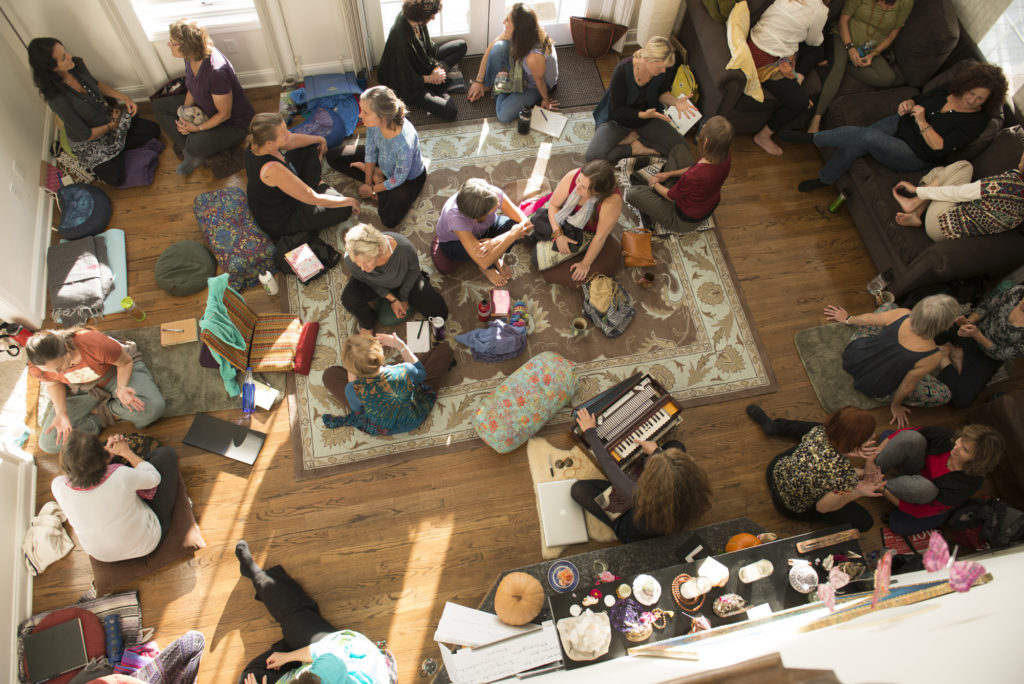
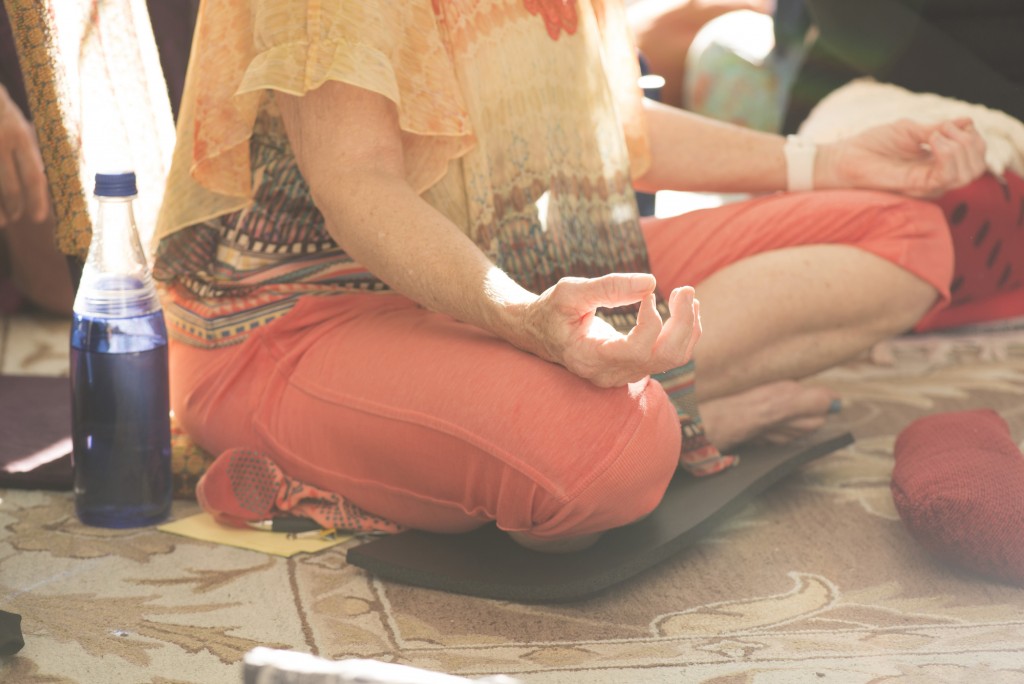
 Centered, grounded, and buzzing with life I left the retreat with a mission on my mind. To continue to form daily bonds with people, even if they are strangers, through small human to human interactions. To stay plugged into my own self with compassion, and honor those around me doing so. And lastly, to continue to pay homage to this collective female divinity around us. So much gratitude to WAH! for creating a space to allow this. For True Nature Education for hosting such wonderful life changing events. And for all the women out there who constantly make the world go around.
Centered, grounded, and buzzing with life I left the retreat with a mission on my mind. To continue to form daily bonds with people, even if they are strangers, through small human to human interactions. To stay plugged into my own self with compassion, and honor those around me doing so. And lastly, to continue to pay homage to this collective female divinity around us. So much gratitude to WAH! for creating a space to allow this. For True Nature Education for hosting such wonderful life changing events. And for all the women out there who constantly make the world go around. 
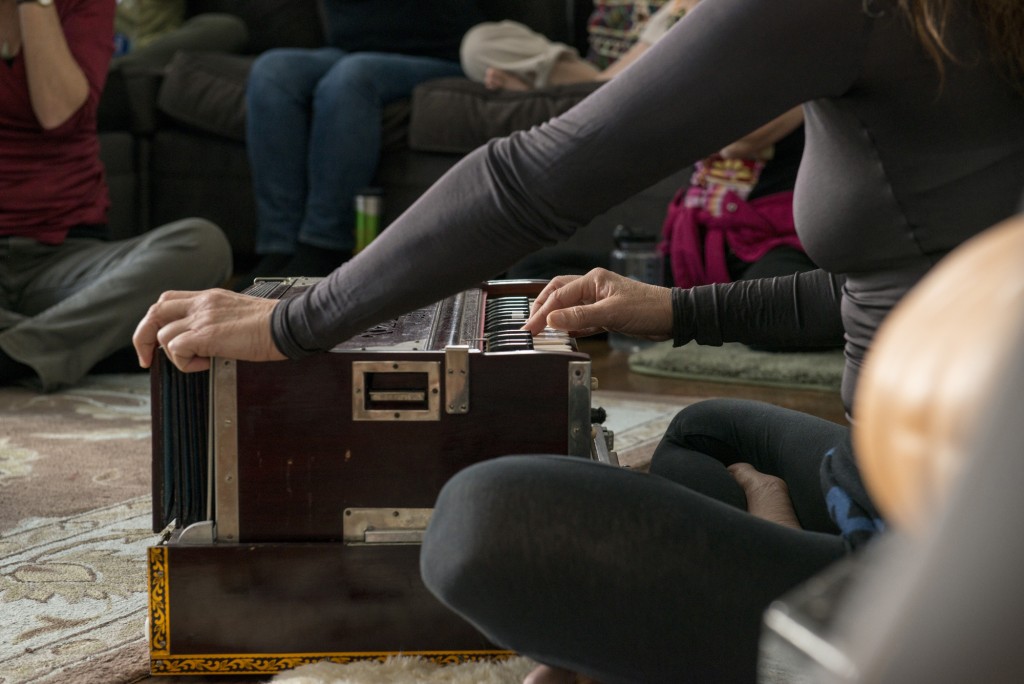
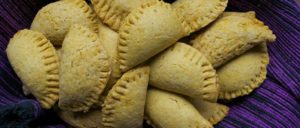
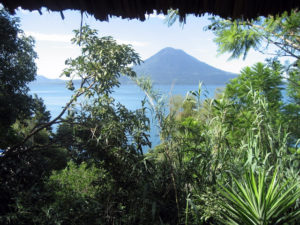
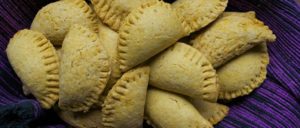
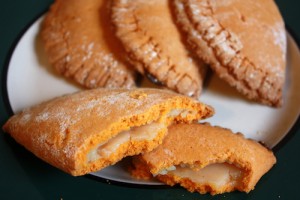
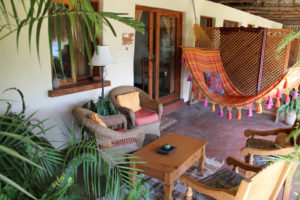
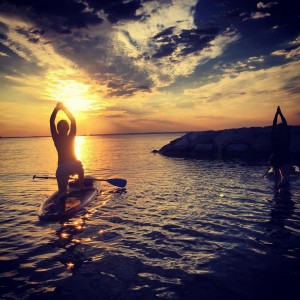
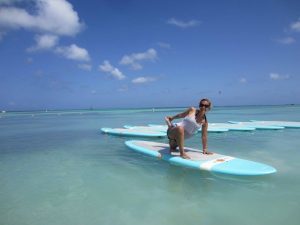
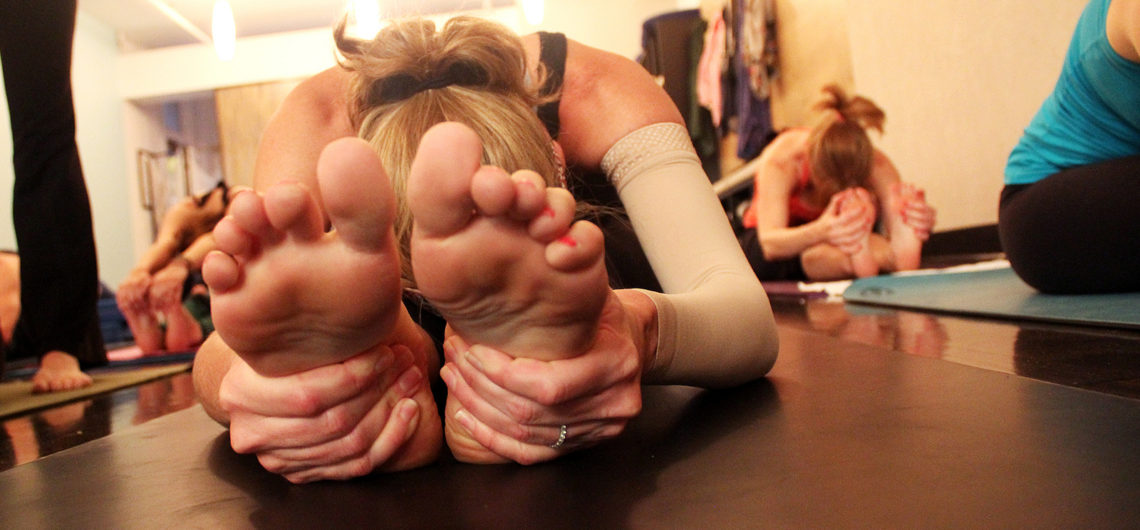
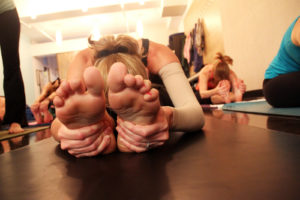 the U.S. in the early 70s and became the most widely known form of hot yoga performed typically at 105 degrees. In the past 5 years hot yoga started to come more mainstream and has flowed over to many different styles of yoga, including studios devoted solely to the practice. Personally, I am a creature of habit. My practice, love, and obsession with yoga really developed during my young adult life in Los Angeles. And what a place to discover this passion! Options, teachers, and styles were endless. I really found my niche with power yoga and as a creature of habit stuck to this practice.Nothing in life is constant, and changes are what makes us who we are. I decided to make a major life change and relocate to the beautiful mountains of Asheville North Carolina. Once again, I found myself in an area whose yoga scene made my heart jump with joy. Embracing this opportunity, I widened my perspective and made a choice to try new styles of yoga.
the U.S. in the early 70s and became the most widely known form of hot yoga performed typically at 105 degrees. In the past 5 years hot yoga started to come more mainstream and has flowed over to many different styles of yoga, including studios devoted solely to the practice. Personally, I am a creature of habit. My practice, love, and obsession with yoga really developed during my young adult life in Los Angeles. And what a place to discover this passion! Options, teachers, and styles were endless. I really found my niche with power yoga and as a creature of habit stuck to this practice.Nothing in life is constant, and changes are what makes us who we are. I decided to make a major life change and relocate to the beautiful mountains of Asheville North Carolina. Once again, I found myself in an area whose yoga scene made my heart jump with joy. Embracing this opportunity, I widened my perspective and made a choice to try new styles of yoga.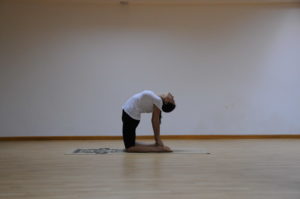 As for hot yoga, it is not for me. But that doesn’t mean it isn’t for you. Do a little research, try a class, and listen to your body. After all, life is just one big experiment and learning experience. Trust yourself and explore more!
As for hot yoga, it is not for me. But that doesn’t mean it isn’t for you. Do a little research, try a class, and listen to your body. After all, life is just one big experiment and learning experience. Trust yourself and explore more!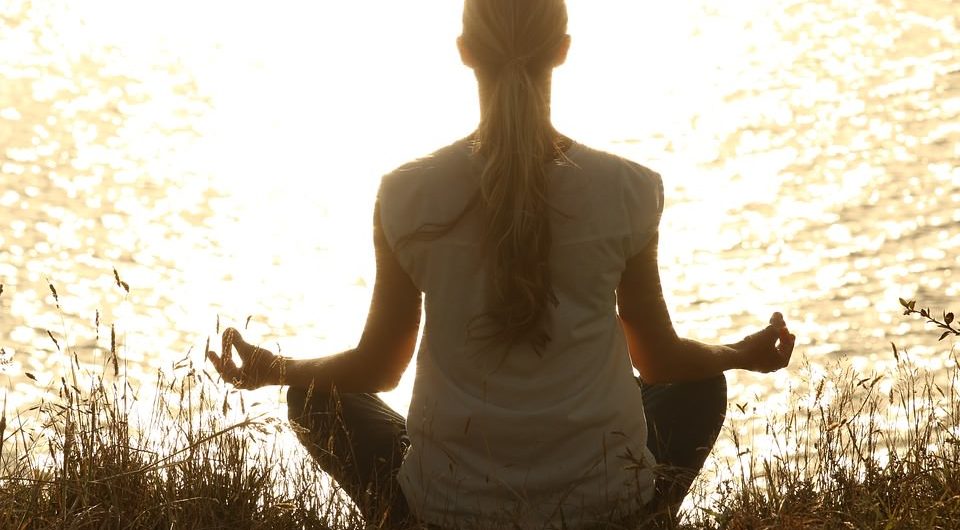
 Your yoga retreat planning is in full motion and there is excitement, anticipation, and perhaps a little anxiety. Will I be able to fill all the spots? How will I get the word out there? All of a sudden, little doubts start to creep in.
Your yoga retreat planning is in full motion and there is excitement, anticipation, and perhaps a little anxiety. Will I be able to fill all the spots? How will I get the word out there? All of a sudden, little doubts start to creep in.




